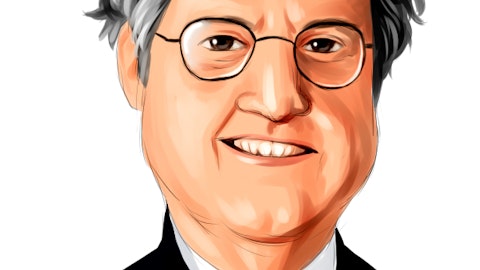4. WESCO International, Inc. (NYSE: WCC)
Murray’s Stake Value: $15,575
Percentage of Clint Murray’s 13F Portfolio: 6.12%
Number of Hedge Fund Holders: 28
WESCO International, Inc. (NYSE: WCC) is a global business-to-business distribution, logistics, and supply chain solutions provider. It was founded in 1922 and is placed fourth on the list of 10 stocks to invest in according to Clint Murray’s Lodge Hill Capital. WESCO International, Inc. (NYSE: WCC) shares have offered investors more than 153% in returns over the course of the past 12 months.
On August 5, WESCO International, Inc. (NYSE: WCC) posted earnings for the second quarter of 2021. The company declared earnings per share of $2.64, beating the estimates by $0.67. On August 6, Wells Fargo analyst Michael McGinn raised the price target on WESCO International, Inc. (NYSE: WCC) to $145 from $125 and maintained an “Overweight” rating on the shares.
Lodge Hill Capital holds 180,000 shares in WESCO International, Inc. (NYSE: WCC), worth over $15 million. This represents 6.12% of their portfolio. At the end of the first quarter of 2021, 28 hedge funds in the database of Insider Monkey held stakes worth $1.03 billion in WESCO International, Inc. (NYSE: WCC), up from 23 the preceding quarter worth $918.18 million.
Roubaix Capital LLC, in its fourth-quarter 2020 investor letter, mentioned WESCO International, Inc. (NYSE: WCC). Here is what the fund said:
“The next largest long contributor was WESCO International (WCC). This company caught our attention due to the highly unusual circumstances that transpired. WCC was in the process of merging with peer Anixter International when private equity investors attempted to buy WCC and then the combined company. The facts were clear that there was significant value. WCC prevailed and was able to finalize the merger and avoid being acquired. However, timing added a wrinkle to the story. The deal closed not long before the pandemic struck and caused meaningful concern about the availability of capital. After the merger, WCC had significant leverage and at that time there was also uncertainty about the stability of their end markets. As our views evolved and as the U.S. Fed stabilized capital markets, we saw opportunities in companies that had meaningful levels of self-help, and we thought the balance sheet risk was less than the market believed. To date, this has been accurate and even the end markets for WCC proved to be resilient during the pandemic. While sharp appreciation has led us to reduce the size of our position in WCC, we anticipate outsized earnings growth in the years ahead from cost savings and an economic recovery.”





